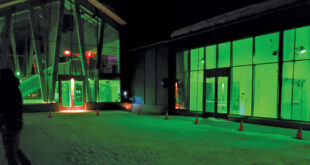A dash of blue in the Marshal’s uniforms and easy access to complaint forms
[ By Mark Reaman ]
The uncomfortable discussion of how to make all segments of the community feel comfortable in Crested Butte, particularly the segment of the population that includes people of color, continued at the Crested Butte Town Council Monday evening. The discussion focused on recommendations from a local Black Lives Matter Community Coalition (BLMCC) subcommittee on what to do to address concerns regarding racial bias in town operations, particularly with the marshal’s department.
Ultimately the council agreed to:
—pay for changes to the marshal’s uniforms to soften the look from an all-black wardrobe and add some blue coloring to the shirts and jackets;
—make it easier and more comfortable for people with a complaint about racial bias to file a complaint with the town’s Human Resources (H.R.) department and not with the marshal’s office;
—investigate ways for the marshals to get out on foot patrol more while also looking for ways to have meaningful dialogue with all segments of the community;
—have the marshals and rest of the town staff participate in Justice, Equality, Diversity and Inclusion (JEDI) training; and
—add specific statements in the town’s employee code that discrimination against people of color or any other group by town employees will not be tolerated.
Efforts will also be explored to extend the new practices to other government entities in Gunnison County.
BLMCC government subcommittee chairperson Laird Cagan presented the recommendations to council with the most detailed suggestions related to the complaint process, and while it was made clear that the recommendations did not mean there were such problems in the town and the marshal’s department, he said the subcommittee did hear stories that could be interpreted as bias.
Council members Mallika Magner and Will Dujardin most adamantly voiced support for the town staff and council to adopt the recommendations.
Making complaints easy and safe
Mayor Jim Schmidt wanted to make sure that complaints could be filed safely but were not made public on the town’s website. “After a complaint goes to H.R. what happens then?” he asked. “Is there an appeal process? Is there an opportunity for the marshal’s office to respond? Does an appeal go to the town manager or is council involved?”
“There are a whole range of responses depending on the actual complaint and situation,” said town manager Dara MacDonald. “The committee wanted a very accessible path to lodge a complaint and we want to make sure the first step is easily available to everyone.”
“We like the ideas behind a lot of the recommendations,” agreed chief marshal Mike Reily. “It is important that people are comfortable making a complaint. We probably need to revamp our policies and procedures to new best practices. We want to find better ways to engage and have dialogue with everyone. For me, this conversation started a way to a better process but not everything can be set up for a department of our size.”
“In the staff response to the recommendations I read that the town feels everything is great,” said Magner. “Can we do better?”
“The marshals are very willing to reach out in new ways,” said MacDonald. “We will work with the BLM committee to figure out the details of what those ways would be. We don’t want to miss out with any segment of the community. We would love suggestions on how to do it better.”
“So nothing will change,” asked Magner.
“Not at all,” replied Reily. “Whatever way we can get out and interact better, we will. We don’t want to insert ourselves into someone’s birthday party but we are always willing to meet with anyone, anytime. I’ve always said that I’ll buy the coffee.”
Dujardin said that while that was a fine sentiment, there were “non-awesome things” happening around the country of late in terms of brutality and systemic racism, and as a law enforcement officer, Reily and his officers were associated with that by some people. “Some people are just not comfortable approaching you to have coffee or talk,” he said. “It feels like we’re not sipping from the same water fountain right now.”
“We understand what is happening in the country,” said Reily. “It’s not happening here. If it is, I want to know about it. I want to know if the things we’re doing in this department are wrong. I’m not seeing it or hearing it but if it is taking place, I want to know about it.”
“Our subcommittee heard stories about some incidents in town where people weren’t treated right,” relayed Cagan. “That’s why we have these recommendations. We didn’t hear a lot but we heard maybe five such stories. We want people to be comfortable voicing when they aren’t treated well. We want people to feel safe when making a complaint.”
“We do too and we want to hear the complaints,” said Reily. “We need to know about the problem in order to fix it.”
Magner pressed Reily and MacDonald that the marshal’s department should not handle complaints. “We are trying to get away from the marshals assessing how a complaint is handled,” she said. “Who decides if a complaint is substantive?”
“It depends on who the complaint goes to,” said MacDonald. “I can’t control that part. Our recommendation is that complaints go to H.R.”
“If we change the policy, and I think we should, we have to figure out the best way for small departments like ours to deal with it,” said Reily. “H.R. can deal with some things but they aren’t equipped to do police investigations, for example.”
“This is not personal, Mike,” said Magner. “It is a nationwide issue and some people just don’t feel comfortable going to the police so the BLM committee is recommending complaints be dealt with outside the department.”
“We are creating a process that is easier for people lodging complaints about bias, not everything,” said MacDonald.
“The complaint process has to apply to everyone,” said Cagan. “So the policy probably needs to apply to every complaint.”
“Then we need more consultation with the town attorney and our insurance company,” said MacDonald.
“I think this is about trying to address complaints about racial bias issues with the marshal’s department,” said Dujardin. “And the council wants to hear if there are complaints about bias in that regard.”
“In such a circumstance, the complaint would always go to H.R and not the marshals,” said MacDonald.
Take a walk
As for getting the marshals out of their police vehicles, Reily and MacDonald said that is currently a priority and takes place when the manpower is available. “We like getting out there and being in the public,” Reily said.
“The number of foot patrols is a moving target, depending on what’s going on,” added MacDonald.
“The BLM committee recommendation is for more foot patrols so can we get more specific on how to get more?” asked Magner.
“We can always do better but tell us what’s missing,” said Reily. “We’re always open to other opportunities.”
“I’m asking the town manager to be more specific and be more responsive to the request,” said Magner.
“It seems like the request is asking the marshals to use their best judgment in that case,” said council member Mona Merrill. “It is probably easier to do some days than others.”
“The marshals are more than willing to do it more as manpower allows,” said MacDonald. “The department doesn’t have the ability with the manpower in place to do it regularly. We just want to manage expectations.”
“Could we look at perhaps a percentage of patrols being done on foot?” asked Dujardin.
“We go where we’re drawn,” responded Reily. “If the bars are packed we walk around Elk Avenue. If the Center has a concert, we walk around the fields. We try to be where the action is.”
Fashion police
As for softening up the look of the current all-black uniforms, Reily said that was doable. It would simply take the council agreeing to spend money to replace shirts and jackets.
“It is harder to find a consistent blue but we will stick with the blue palette,” said Reily. “Not so much a specific blue but a range of blue.”
“They may not match perfectly,” said MacDonald.
Council agreed to spend approximately $7,000 to make the fashionable change in color palette.
MacDonald will bring council more detailed modifications for the council at a future meeting to consider adding to the employee handbook to address the BLM concerns.
 The Crested Butte News Serving the Gunnison Valley since 1999
The Crested Butte News Serving the Gunnison Valley since 1999



